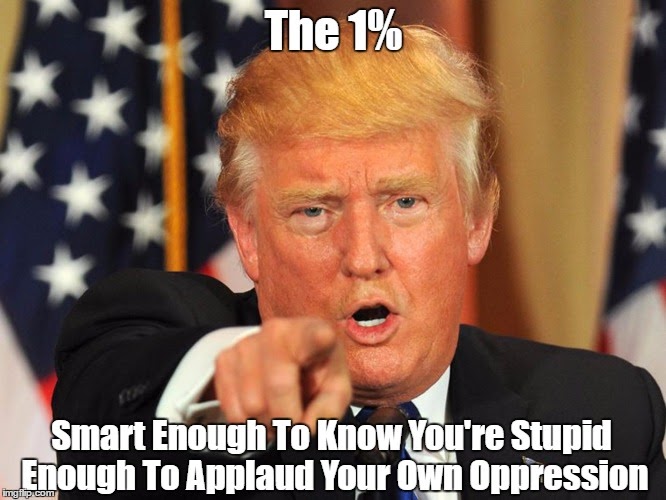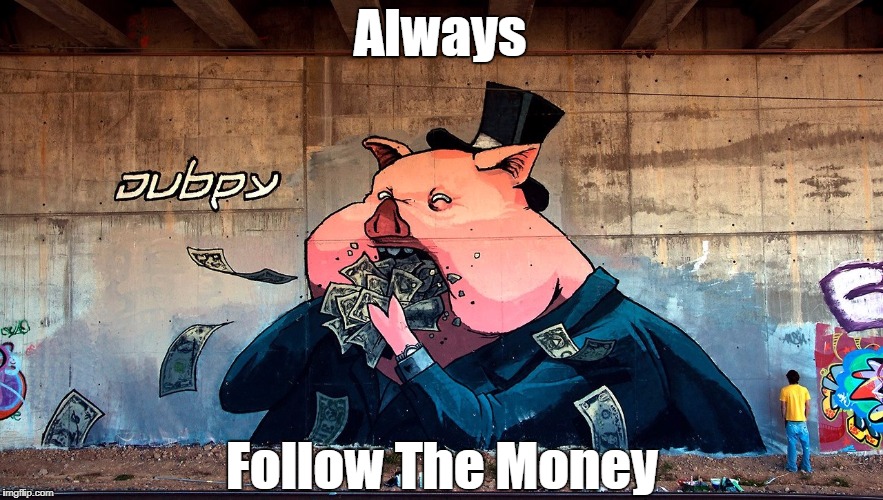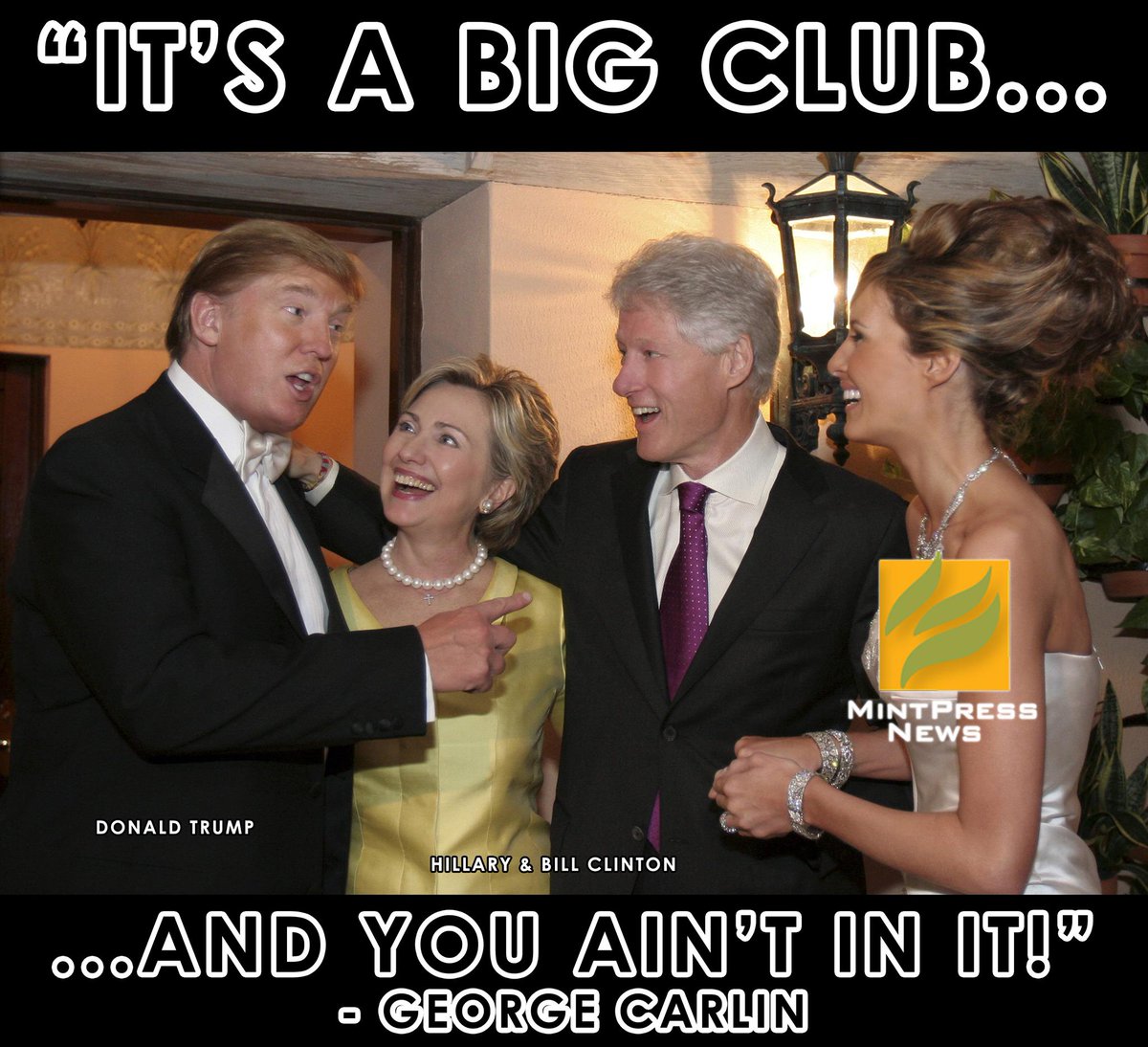"Democracy is the art of running the circus from the monkey cage."
H.L. Mencken
Is The U.S. Really An Oligarchy As Princeton Research Concludes?
http://paxonbothhouses.blogspot.com/2014/04/is-us-really-oligarchy-as-princeton.html

Frank Zappa Profesies Fascist Theocracy
Video
"The Pitchforks Are Coming... For Us Billionaires," Amazon Financier, Nick Hanauer
Income Inequality: Either The Rich Agree To Do Something Or Hell Breaks Loose
http://paxonbothhouses.blogspot.com/2014/07/income-inequality-either-rich-agree-to.html
"Plutocracy Triumphant"
Cartoon Compendium
"Politics And Economics: The 101 Courses You Wish You Had"
"Politics And Economics: The 101 Courses You Wish You Had"

Princeton Concludes What Kind of Government America Really Has, and It's Not a Democracy
Tom McCay, April 16, 2014
Excerpt: "It's beyond alarming. As Gilens and Page write, "the preferences of the average American appear to have only a minuscule, near-zero, statistically non-significant impact upon public policy." In other words, their statistics say your opinion literally does not matter."
The news: The United States isn't a democracy any more. And they've found that in fact, America is basically an oligarchy... a system where power is effectively wielded by a small number of socio-economically powerful people known as oligarchs.
The news: The United States isn't a democracy any more. And they've found that in fact, America is basically an oligarchy... a system where power is effectively wielded by a small number of socio-economically powerful people known as oligarchs.
Members of the oligarchy are the rich, the well connected and the politically powerful, as well as well placed individuals in institutions like banking and finance or the military.

For their study, Gilens and Page compiled data from roughly 1,800 different policy initiatives in the years between 1981 and 2002. They then compared those policy changes with the expressed opinion of the United State public. Comparing the preferences of the average American at the 50th percentile of income to what those Americans at the 90th percentile preferred, as well as the opinions of major lobbying or business groups, the researchers found out that the government followed the directives set forth by the latter two times more often.
It's beyond alarming. As Gilens and Page write, "the preferences of the average American appear to have only a minuscule, near-zero, statistically non-significant impact upon public policy." In other words, their statistics say your opinion literally does not matter.
That might explain why mandatory background checks on gun sales supported by 83% to 91% of Americans aren't in place, or why Congress has taken no action on greenhouse gas emissions even when such legislation is supported by the vast majority of citizens.
This problem has been steadily escalating for four decades. While there are some limitations to their data set, economists Thomas Piketty and Emmanuel Saez constructed income statistics based on IRS data that go back to 1913. They found thatthe gap between the ultra-wealthy and the rest of us is much bigger than you would think, as mapped by these graphsfrom the Center On Budget and Policy Priorities:


Piketty and Saez also calculated that as of September 2013 the top 1% of earners had captured 95% of all income gains since the Great Recession ended. The other 99% saw a net 12% drop to their income. So not only is oligarchy making the rich richer, it's driving policy that's made everyone else poorer.
What kind of oligarchy? As Gawker's
In either case, the result is the same: Big corporations, the ultra-wealthy and special interests with a lot of money and power essentially make all of the decisions.
Citizens wield little to no political power. America, the findings indicate, tends towards either of these much more than anything close to what we call "democracy" — systems such as majoritarian electoral democracy or majoritarian pluralism, under which the policy choices pursued by the government would reflect the opinions of the governed.
Nothing new: And no, this isn't a problem that's the result of any recent Supreme Court cases — at least certainly not the likes FEC v. Citizens United or FEC v. McCutcheon. The data is pretty clear that America has been sliding steadily into oligarchy for decades, mirrored in both the substantive effect on policy and in the distribution of wealth throughout the U.S. But cases like those might indicate the process is accelerating.
"Perhaps economic elites and interest group leaders enjoy greater policy expertise than the average citizen does," Gilens and Page write. "Perhaps they know better which policies will benefit everyone, and perhaps they seek the common good, rather than selfish ends, when deciding which policies to support.
"But we tend to doubt it."
"Pope Francis Links"
Pope Francis: Quotations On Finance, Economics, Capitalism And Inequality
The US is dominated by a rich and powerful elite.
So concludes a recent study by Princeton University Prof Martin Gilens and Northwestern University Prof Benjamin I Page.
This is not news, you say.
Perhaps, but the two professors have conducted exhaustive research to try to present data-driven support for this conclusion. Here's how they explain it:
Multivariate analysis indicates that economic elites and organised groups representing business interests have substantial independent impacts on US government policy, while average citizens and mass-based interest groups have little or no independent influence.
In English: the wealthy few move policy, while the average American has little power.
The two professors came to this conclusion after reviewing answers to 1,779 survey questions asked between 1981 and 2002 on public policy issues. They broke the responses down by income level, and then determined how often certain income levels and organised interest groups saw their policy preferences enacted.
"A proposed policy change with low support among economically elite Americans (one-out-of-five in favour) is adopted only about 18% of the time," they write, "while a proposed change with high support (four-out-of-five in favour) is adopted about 45% of the time."
On the other hand:
When a majority of citizens disagrees with economic elites and/or with organised interests, they generally lose. Moreover, because of the strong status quo bias built into the US political system, even when fairly large majorities of Americans favour policy change, they generally do not get it.
They conclude:
Americans do enjoy many features central to democratic governance, such as regular elections, freedom of speech and association and a widespread (if still contested) franchise. But we believe that if policymaking is dominated by powerful business organisations and a small number of affluent Americans, then America's claims to being a democratic society are seriously threatened.
Eric Zuess, writing in Counterpunch, isn't surprised by the survey's results.
"American democracy is a sham, no matter how much it's pumped by the oligarchs who run the country (and who control the nation's "news" media)," he writes. "The US, in other words, is basically similar to Russia or most other dubious 'electoral' 'democratic' countries. We weren't formerly, but we clearly are now."
This is the "Duh Report", says Death and Taxes magazine's Robyn Pennacchia. Maybe, she writes, Americans should just accept their fate.
"Perhaps we ought to suck it up, admit we have a classist society and do like England where we have a House of Lords and a House of Commoners," she writes, "instead of pretending as though we all have some kind of equal opportunity here."

Rich People Rule!
Larry Bartels
Everyone thinks they know that money is important in American politics.
But howimportant? The Supreme Court’s Gilded Age reasoning in McCutcheon v. FEC has inspired a flurry of commentary regarding the potential corrosive influence of campaign contributions; but that commentary largely ignores the broader question of how economic power shapes American politics and policy. For decades, most political scientists have sidestepped that question, because it has not seemed amenable to rigorous (meaning quantitative) scientific investigation. Qualitative studies of the political role of economic elites have mostly been relegated to the margins of the field. But now, political scientists are belatedly turning more systematic attention to the political impact of wealth, and their findings should reshape how we think about American democracy.
A forthcoming article in Perspectives on Politics by (my former colleague) Martin Gilens and (my sometime collaborator) Benjamin Page marks a notable step in that process. Drawing on the same extensive evidence employed by Gilens in his landmark book “Affluence and Influence,” Gilens and Page analyze 1,779 policy outcomes over a period of more than 20 years. They conclude that “economic elites and organized groups representing business interests have substantial independent impacts on U.S. government policy, while mass-based interest groups and average citizens have little or no independent influence.”
Average citizens have “little or no independent influence” on the policy-making process? This must be an overstatement of Gilens’s and Page’s findings, no?
Alas, no. In their primary statistical analysis, the collective preferences of ordinary citizens had only a negligible estimated effect on policy outcomes, while the collective preferences of “economic elites” (roughly proxied by citizens at the 90th percentile of the income distribution) were 15 times as important. “Mass-based interest groups” mattered, too, but only about half as much as business interest groups — and the preferences of those public interest groups were only weakly correlated (.12) with the preferences of the public as measured in opinion surveys.
Gilens and Page frame their study as a test of four broad theories of American politics: “Majoritarian Electoral Democracy,” “Majoritarian Pluralism,” “Economic Elite Domination” and “Biased Pluralism.” “Majoritarian Electoral Democracy,” with its emphasis on public opinion, elections and representation, provides the theoretical backbone of most contemporary political science (including mine). The training of most graduate students (including mine) is primarily couched in that framework. But Gilens’s and Page’s work makes that look like a bad scientific bet, wishfully ignoring most of what actually drives American policy-making.
The theory of “Majoritarian Pluralism” emphasizes the role of organized interests, but assumes that most ordinary citizens will be fairly well represented in the tug-of-war among interest groups. It flourished in the mid-20th century, perhaps most notably in the work of David Truman and the early Robert Dahl, but has been much less prominent in recent years. The “Economic Elite Domination” and “Biased Pluralism” perspectives have been even less prominent in mainstream political science, although they have been deployed selectively by E. E. Schattschneider and Charles Lindblom, and in a more sustained fashion by G. William Domhoff, Thomas Ferguson and others.
Gilens’s and Page’s analysis suggests that we need a lot more research on “Economic Elite Domination” and “Biased Pluralism.” Stronger empirical tests of the political influence of economic elites will require better evidence regarding the political preferences and activities of wealthy Americans. Page, Jason Seawright and I have made a small start in that direction with a pilot survey of millionaires in the Chicago area. In a paper presented at last week’s meeting of the Midwest Political Science Association, Page and Seawright began to explore a different approach, trying to learn about the political views of Forbes 400 billionaires by web-scraping their public comments and contribution records.
We also need narrower studies of specific channels of political influence. Joshua Kalla and David Broockman’s recent field experiment focusing on access to members of Congress provides an elegant example of that sort of work. A political organization contacted 191 congressional offices requesting meetings to discuss a pending bill. The organization’s members were randomly identified either as constituents or as campaign donors. Of the people identified as donors, 19 percent got meetings with the member of Congress or a top staffer, but only 5 percent of those identified as constituents (not as donors) got similar access. Clearly, as Kalla and Broockman observe, “individuals can command greater attention from influential policymakers by contributing to campaigns.” While that finding in itself does not tell us whether “greater attention” actually translates into substantial policy influence, it does shed clear light on one piece of the much broader process of “Economic Elite Domination” stunningly documented by Gilens and Page.
Larry Bartels holds the May Werthan Shayne Chair of Public Policy and Social Science at Vanderbilt University. He has written extensively on American electoral politics, public opinion, representation, and public policy. His books include Unequal Democracy: The Political Economy of the New Gilded Age.
Favorite George Carlin Shticks

American Exceptionalism: "Like The American Dream You Have To Be Asleep To Believe In It"
http://paxonbothhouses.blogspot.com/2017/10/american-exceptionalism-like-american.html
Favorite George Carlin Shticks
http://paxonbothhouses.blogspot.com/2017/10/american-exceptionalism-like-american.html

Is the U.S. really an oligarchy? "The paper is a provocative one, and there's sure to be a lot of debate among political scientists about whether it wholly supports the authors' claims....There can be no doubt that economic elites have a disproportionate influence in Washington, or that their views and interests distort policy in ways that don't necessarily benefit the majority: the politicians all know this, and we know it, too. The only debate is about how far this process has gone, and whether we should refer to it as oligarchy or as something else." John Cassidy in The New Yorker.
"Plutocracy Triumphant"
Cartoon Compendium
Compendium Of Best Pax Posts: Plutocracy, Economic Inequality & Collapse Of Conservatism
Compendium Of Best Pax Posts: Plutocracy, Economic Inequality & Collapse Of Conservatism
"Politics And Economics: The 101 Courses You Wish You Had"
"Politics And Economics: The 101 Courses You Wish You Had"
Pope Francis: Quotations On Finance, Economics, Capitalism And Inequality
Teddy Roosevelt: "Malefactors Of Great Wealth... Are Curses To The Country"
Why Are Americans So Poorly Paid. This One Chart Will Even Shame The 1%
Teddy Roosevelt: "Malefactors Of Great Wealth... Are Curses To The Country"
Why Are Americans So Poorly Paid. This One Chart Will Even Shame The 1%
Inequality: Joseph Stiglitz Brilliant Reflection On Obama's State Of The Union Address
"Of The 1%, By The 1%, For The 1%,"
Nobel Laureate Joseph Stiglitz
It's Not About Income. "It's About Net Worth, Stupid!"
It's Not About Income. "It's About Net Worth, Stupid!"
American Plutocracy: Who's Punished And Who's Not
http://paxonbothhouses.
G.K. Chesterton: "The Anarchy of The Rich"
G.K. Chesterton and Warren Buffett's Class War
Chesterton Viewed The Rich As "Oppressive" "Scum" And Failures
G.K. Chesterton: "The Anarchy of The Rich"
Chesterton Viewed The Rich As "Oppressive" "Scum" And Failures
No comments:
Post a Comment